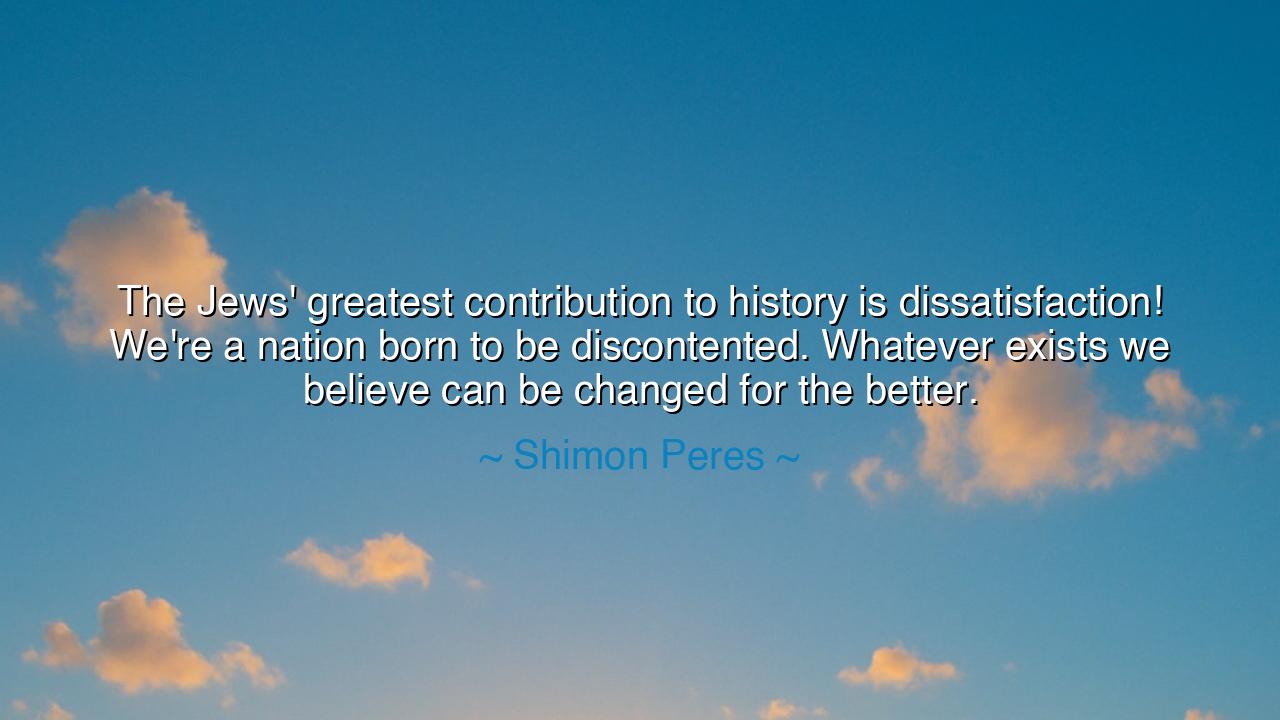
The Jews' greatest contribution to history is dissatisfaction!
The Jews' greatest contribution to history is dissatisfaction! We're a nation born to be discontented. Whatever exists we believe can be changed for the better.






“The Jews’ greatest contribution to history is dissatisfaction! We’re a nation born to be discontented. Whatever exists we believe can be changed for the better.” Thus spoke Shimon Peres, the statesman, visionary, and dreamer of Israel — a man who saw in his people not only endurance but transformation. In this bold declaration lies a truth both humbling and profound: that dissatisfaction, far from being a curse, can be the sacred fire that drives humanity toward progress. To Peres, this discontent was not mere restlessness, but the divine spark of improvement — a refusal to accept the world as it is when it could be more just, more beautiful, more alive.
The origin of this spirit lies deep in the heart of Jewish history, a story carved in exile, struggle, and faith. For thousands of years, the Jewish people wandered the deserts of the earth — from Egypt to Babylon, from Europe to the new land of Israel — yet they never ceased to question, to hope, to build anew. In their Scriptures, one finds not complacency, but conversation with the Divine itself: Abraham arguing with God over the fate of Sodom, Moses pleading for mercy for his people, Job demanding an answer for his suffering. This tradition of holy questioning, of dissatisfaction with injustice, became not rebellion, but reverence — the belief that to seek betterment is itself an act of faith.
Peres, who helped shape a nation born from ashes, understood this legacy with the clarity of one who lived it. After the horrors of the Holocaust, when six million voices were silenced, the Jewish people might have turned to despair. Yet from that ruin rose the modern state of Israel, not as an act of vengeance, but as an act of hope — the greatest testament to that sacred discontent. For dissatisfaction, when guided by vision, becomes creation. It builds cities in deserts, grows trees where there was dust, and dares to dream of peace even in the midst of war. This, Peres believed, was the truest inheritance of his people: not contentment with survival, but the determination to transform survival into renewal.
But his words speak beyond one people — they speak to all humanity. For progress, in every age, has been born of those who were dissatisfied. It was dissatisfaction that made Galileo raise his telescope to the heavens and see beyond the dogmas of his time. It was dissatisfaction that made Martin Luther King Jr. dream of equality in a land divided by hatred. It was dissatisfaction that made scientists seek cures for diseases, artists paint what had never been seen, and poets give voice to what had never been said. Every step forward in civilization has been the work of those who dared to say, “This is not enough — it can be better.” In that sense, the discontent of the Jewish spirit is a mirror of the divine impulse in all of us — the longing for creation, for progress, for redemption.
Yet there is wisdom in how Peres speaks of this dissatisfaction. It is not bitterness, nor complaint, nor endless rebellion for its own sake. It is constructive discontent, born from love and faith in what humanity can become. It is the dissatisfaction of the gardener who tends the soil, not to curse it, but to bring forth fruit. To be discontented in this way is to live with vision — to look at a broken world and see not its flaws alone, but its potential. Such discontent does not destroy; it builds. It does not despair; it dreams. It is the dissatisfaction of the builder, not the cynic — the kind of sacred unease that turns complaint into compassion, and frustration into progress.
Peres himself embodied this. As both warrior and peacemaker, he never ceased to believe that even the most divided of enemies could find common ground. His pursuit of peace with the Palestinians — though fraught and incomplete — came from the same conviction that has driven the Jewish spirit for millennia: that whatever exists can be changed for the better. To him, resignation was the true defeat, and imagination was the truest act of courage. He knew that perfection would never be reached, yet he also knew that the striving itself — the restless hope — was what gave life meaning.
So, my child of tomorrow, take this teaching to heart. Do not fear dissatisfaction — honor it. For it is the sign of a soul still awake. The complacent man builds no bridges, heals no wounds, and leaves no legacy. But the one who is lovingly discontent — who looks at suffering and says, “This can change” — becomes a partner in creation itself. Let your dissatisfaction be noble; let it be guided by vision and compassion. Question injustice. Improve what is within your reach. Refuse to settle for mediocrity when excellence is possible. For as Shimon Peres taught, it is the discontented spirit that lifts humanity forward — that eternal refusal to rest in the present when the future still calls.
And remember this, as the ancients did: to be dissatisfied is not to reject the world, but to love it too much to leave it unchanged. The greatest contribution to history — from prophets to poets, from builders to dreamers — has always been this sacred restlessness. The day humanity grows content is the day progress dies. Therefore, embrace your dissatisfaction as a divine gift, and use it not to destroy, but to create. For in striving to make the world better, you fulfill the oldest and most enduring purpose of all: to be human, and to keep hope alive.






AAdministratorAdministrator
Welcome, honored guests. Please leave a comment, we will respond soon